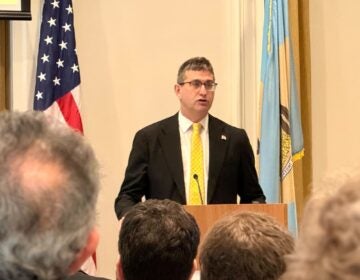‘Butt out’: Legislation easing zoning rules for Del. marijuana stores passes state Senate despite concerns over local control
Some state senators complained that the state of Delaware was removing local control from counties.
Listen 0:55
File - A cannabis plant that is close to harvest grows June 17, 2021. (AP Photo/Steve Helber)
From Philly and the Pa. suburbs to South Jersey and Delaware, what would you like WHYY News to cover? Let us know!
Legislation aimed at easing local government zoning restrictions on recreational cannabis facilities is heading to the Delaware House after passing in the Senate.
It drew fierce opposition during debate Wednesday afternoon, mostly from senators representing southern Delaware, which has severely limited retail stores from opening through zoning ordinances. All Republican senators voted no, along with two Democrats, Sen. Darius Brown, D-Wilmington, and Sen. Russell Huxtable, D-Lewes. The bill passed 13-8.
Several opponents of the legislation criticized the proposal for taking control over where cannabis operations can be located within the state.
“As a resident of Sussex County, again, I’m very proud of what Sussex County has done, and I would like for the state of Delaware to butt out,” said Sen. Bryant Richardson, R-Seaford.
Under the bill, sponsored by state Sen. Trey Paradee, D-Dover, state zoning rules would supersede current county and city ordinances. It would require local governments to allow medical marijuana dispensaries who were granted conversion licenses to also sell recreational pot as a retail store and make building improvements to do both as necessary.
Retail weed stores in commercial- or industrial-zoned areas would be allowed as long as they are not within a half-mile of another recreational cannabis store or within 500 feet of a school, day care, residential substance abuse treatment facility, park or library. An amendment removed places of worship from the list. Fully enclosed cultivation facilities must be allowed in areas zoned for agricultural or industrial use.
Sussex County mandated a buffer of 3 miles between cannabis shops and other facilities, such as a city boundary, churches, schools, colleges, day cares and substance abuse treatment centers. The New Castle County buffer is 1,000 feet.
Paradee’s bill would also require that each of the three counties allow retail marijuana stores to be open from 9 a.m. until 9 p.m. Monday through Saturday and from noon until 8 p.m. on Sunday.
He said Sussex County leaders in particular used language in prior legislation creating the legal pot industry to block shops operating in southern Delaware.
“What they have done in Sussex County is they’ve effectively made it illegal to operate a retail marijuana store,” Paradee said.
Lawmakers legalized recreational cannabis in 2023, creating a system for licensing cultivators, manufacturers, retailers and testing laboratories. The state also created a pool of social equity licenses so people who have been negatively affected by past marijuana crime enforcement can enter the market with lower barriers to access.
The state conducted a lottery system that awarded 125 adult-use recreational market licenses, with 30 retail stores planned throughout the state — 14 in New Castle County, 10 in Sussex County and six in Kent County. Seven conversion licenses were given to medical dispensaries so they could sell both medical and recreational cannabis out of their existing facilities. The cost of those licenses range from $100,000 to $200,000.
Paradee said medical marijuana businesses have been good neighbors. Sen. Kyra Hoffner, D-Smyrna, said the legal industry is needed to shut down the black market.
“We’re not asking them to have it on every street corner, like there’s a liquor store or opiates being sold everywhere,” she said. “What we are asking for is a regulated market so people will stop buying it in the illicit market and stay safe.”
Sen. Brian Pettyjohn, R-Georgetown, said he was concerned a loss of local control for counties would become a slippery slope.
“Starting this right now is very dangerous,” he said. “That’s going to start the process of the state telling counties you have to allow other things that may not fit well with the community, well with their neighborhoods.”
New Castle County and Sussex County council members told WHYY News last month they would resist the state telling them how to make zoning and land use decisions.
“If I had my way, I’d say, let’s let the county and the state go to court,” New Castle County Councilman Dave Carter said. “At this point, I think [the state] should stay out of it, but if they don’t, then we’ll let the courts decide.”
The state’s market for recreational sales was supposed to open this month, but has been delayed because of the strict zoning ordinances and the Federal Bureau of Investigation twice denying the state’s application to create a fingerprinting system for criminal background checks of cannabis retail license holders. A bill fixing the state statute outlining the background check requirements has passed the House and is waiting for consideration in the Senate.
This story was supported by a statehouse coverage grant from the Corporation for Public Broadcasting.

Get daily updates from WHYY News!
WHYY is your source for fact-based, in-depth journalism and information. As a nonprofit organization, we rely on financial support from readers like you. Please give today.







